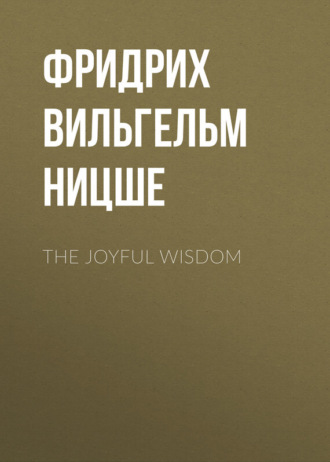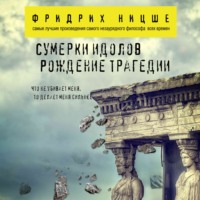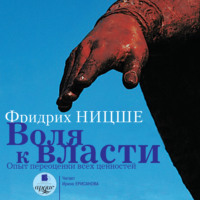 полная версия
полная версияThe Joyful Wisdom
Different Dissatisfactions. —The feeble and as it were feminine dissatisfied people, have ingenuity for beautifying and deepening life; the strong dissatisfied people – the masculine persons among them to continue the metaphor – have ingenuity for improving and safeguarding life. The former show their weakness and feminine character by willingly letting themselves be temporarily deceived, and perhaps even by putting up with a little ecstasy and enthusiasm on a time, but on the whole they are never to be satisfied, and suffer from the incurability of their dissatisfaction; moreover they are the patrons of all those who manage to concoct opiate and narcotic comforts, and on that account are averse to those who value the physician higher than the priest, – they thereby encourage the continuance of actual distress! If there had not been a surplus of dissatisfied persons of this kind in Europe since the time of the Middle Ages, the remarkable capacity of Europeans for constant transformation would perhaps not have originated at all; for the claims of the strong dissatisfied persons are too gross, and really too modest to resist being finally quieted down. China is an instance of a country in which dissatisfaction on a grand scale and the capacity for transformation have died out for many centuries; and the Socialists and state-idolaters of Europe could easily bring things to Chinese conditions and to a Chinese "happiness," with their measures for the amelioration and security of life, provided that they could first of all root out the sicklier, tenderer, more feminine dissatisfaction and Romanticism which are still very abundant among us. Europe is an invalid who owes her best thanks to her incurability and the eternal transformations of her sufferings; these constant new situations, these equally constant new dangers, pains, and make-shifts, have at last generated an intellectual sensitiveness which is almost equal to genius, and is in any case the mother of all genius.
25Not Pre-ordained to Knowledge.– There is a pur-blind humility not at all rare, and when a person is afflicted with it, he is once for all disqualified for being a disciple of knowledge. It is this in fact: the moment a man of this kind perceives anything striking, he turns as it were on his heel and says to himself: "You have deceived yourself! Where have your wits been! This cannot be the truth!" – and then, instead of looking at it and listening to it with more attention, he runs out of the way of the striking object as if intimidated, and seeks to get it out of his head as quickly as possible. For his fundamental rule runs thus: "I want to see nothing that contradicts the usual opinion concerning things! Am I created for the purpose of discovering new truths? There are already too many of the old ones."
26What is Living?– Living – that is to continually eliminate from ourselves what is about to die; Living – that is to be cruel and inexorable towards all that becomes weak and old in ourselves and not only in ourselves. Living – that means, there fore to be without piety toward the dying, the wrenched and the old? To be continually a murderer? – And yet old Moses said: "Thou shalt not kill!"
27The Self-Renouncer.– What does the self-renouncer do? He strives after a higher world, he wants to fly longer and further and higher than all men of affirmation – he throws away many things that would impede his flight, and several things among them that are not valueless, that are not unpleasant to him: he sacrifices them to his desire for elevation. Now this sacrificing, this casting away, is the very thing which becomes visible in him: on that account one calls him a self-renouncer, and as such he stands before us, enveloped in his cowl, and as the soul of a hair-shirt. With this effect, however, which he makes upon us he is well content: he wants to keep concealed from us his desire, his pride, his intention of flying above us. – Yes! He is wiser than we thought, and so courteous towards us – this affirmer! For that is what he is, like us, even in his self-renunciation.
28Injuring with ones best Qualities.– Out strong points sometimes drive us so far forward that we cannot any longer endure our weaknesses, and we perish by them: we also perhaps see this result beforehand, but nevertheless do not want it to be otherwise. We then become hard towards that which would fain be spared in us, and our pitilessness is also our greatness. Such an experience, which must in the end cost us our Hie, is a symbol of the collective effect of great men upon others and upon their epoch: – it is just with their best abilities, with that which only they can do, that they destroy much that is weak, uncertain, evolving, and willing, and are thereby injurious. Indeed, the case may happen in which, taken on the whole, they only do injury, because their best is accepted and drunk up as it were solely by those who lose their understanding and their egoism by it, as by too strong a beverage; they become so intoxicated that they go breaking their limbs on all the wrong roads where their drunkenness drives them.
29Adventitious Liars.– When people began to combat the unity of Aristotle in France, and consequently also to defend it, there was once more to be seen that which has been seen so often, but seen so unwillingly: —people imposed false reasons on themselves on account of which those laws ought to exist, merely for the sake of not acknowledging to themselves that they had accustomed themselves to the authority of those laws, and did not want any longer to have things otherwise. And people do so in every prevailing morality and religion, and have always done so: the reasons and intentions behind the habit, are only added surreptitiously when people begin to combat the habit, and ask for reasons and intentions. It is here that the great dishonesty of the conservatives of all times hides: – they are adventitious liars.
30The Comedy of Celebrated Men. —Celebrated men who need their fame, as, for instance, all politicians, no longer select their associates and friends without fore-thought: from the one they want a portion of the splendour and reflection of his virtues; from the other they want the fear-inspiring power of certain dubious qualities in him, of which everybody is aware; from another they steal his reputation for idleness and basking in the sun, because it is advantageous for their own ends to be regarded temporarily as heedless and lazy: – it conceals the fact that they lie in ambush; they now use the visionaries, now the experts, now the brooders, now the pedants in their neighbourhood, as their actual selves for the time; but very soon they do not need them any longer! And thus while their environment and outside die off continually, everything seems to crowd into this environment, and wants to become a "character" of it; they are like great cities in this respect. Their repute is continually in process of mutation, like their character, for their changing methods require this change, and they show and exhibit sometimes this and sometimes that actual or fictitious quality on the stage; their friends and associates, as we have said, belong to these stage properties. On the other hand, that which they aim at must remain so much the more steadfast, and burnished and resplendent in the distance, – and this also sometimes needs its comedy and its stage-play.
31Commerce and Nobility.– Buying and selling is now regarded as something ordinary, like the art of reading and writing; everyone is now trained to it even when he is not a tradesman exercising himself daily in the art; precisely as formerly in the period of uncivilised humanity, everyone was a hunter and exercised himself day by day in the art of hunting. Hunting was then something common: but just as this finally became a privilege of the powerful and noble, and thereby lost the character of the commonplace and the ordinary – by ceasing to be necessary and by becoming an affair of fancy and luxury, – so it might become the same some day with buying and selling. Conditions of society are imaginable in which there will be no selling and buying, and in which the necessity for this art will become quite lost; perhaps it may then happen that individuals who are less subjected to the law of the prevailing condition of things will indulge in buying and selling as a luxury of sentiment. It is then only that commerce would acquire nobility, and the noble would then perhaps occupy themselves just as readily with commerce as they have done hitherto with war and politics: while on the other hand the valuation of politics might then have entirely altered. Already even politics ceases to be the business of a gentleman; and it is possible that one day it may be found to be so vulgar as to be brought, like all party literature and daily literature, under the rubric: "Prostitution of the intellect."
32Undesirable Disciples.– What shall I do with these two youths! called out a philosopher dejectedly, who "corrupted" youths, as Socrates had once corrupted them, – they are unwelcome disciples to me. One of them cannot say "Nay," and the other says "Half and half" to everything. Provided they grasped my doctrine, the former would suffer too much, for my mode of thinking requires a martial soul, willingness to cause pain, delight in denying, and a hard skin, – he would succumb by open wounds and internal injuries. And the other will choose the mediocre in everything he represents, and thus make a mediocrity of the whole, – I should like my enemy to have such a disciple.
33Outside the Lecture-room.– "In order to prove that man after all belongs to the good-natured animals, I would remind you how credulous he has been for so long a time. It is now only, quite late, and after an immense self-conquest, that he has become a distrustful animal, – yes! man is now more wicked than ever." – I do not understand this; why should man now be more distrustful and more wicked? – "Because now he has science, – because he needs to have it!" —
34Historia abscondita.– Every great man has a power which operates backward; all history is again placed on the scales on his account, and a thousand secrets of the past crawl out of their lurking-places – into his sunlight. There is absolutely no knowing what history may be some day. The past is still perhaps undiscovered in its essence! There is yet so much reinterpreting ability needed!
35Heresy and Witchcraft.– To think otherwise than is customary – that is by no means so much the activity of a better intellect, as the activity of strong, wicked inclinations, – severing, isolating, refractory, mischief-loving, malicious inclinations. Heresy is the counterpart of witchcraft, and is certainly just as little a merely harmless affair, or a thing worthy of honour in itself. Heretics and sorcerers are two kinds of bad men; they have it in common that they also feel themselves wicked; their unconquerable delight is to attack and injure whatever rules, – whether it be men or opinions. The Reformation, a kind of duplication of the spirit of the Middle Ages at a time when it had no longer a good conscience, produced both of these kinds of people in the greatest profusion.
36Last Words.-It will be recollected that the Emperor Augustus, that terrible man, who had himself as much in his own power and could be silent as well as any wise Socrates, became indiscreet about himself in his last words; for the first time he let his mask fall, when he gave to understand that he had carried a mask and played a comedy, – he had played the father of his country and wisdom on the throne well, even to the point of illusion! Plaudite amid, comœdia finita est! —The thought of the dying Nero: qualis artifex pereo! was also the thought of the dying Augustus: histrionic conceit! histrionic loquacity! And the very counterpart to the dying Socrates! – But Tiberius died silently, that most tortured of all self-torturers, —he was genuine and not a stage-player! What may have passed through his head in the end! Perhaps this: "Life – that is a long death. I am a fool, who shortened the lives of so many! Was I created for the purpose of being a benefactor? I should have given them eternal life: and then I could have seen them dying eternally. I had such good eyes for that: qualis spectator pereo!" When he seemed once more to regain his powers after a long death-struggle, it was considered advisable to smother him with pillows, – he died a double death.
37Owing to three Errors.– Science has been furthered during recent centuries, partly because it was hoped that God's goodness and wisdom would be best understood therewith and thereby – the principal motive in the soul of great Englishmen (like Newton); partly because the absolute utility of knowledge was believed in, and especially the most intimate connection of morality, knowledge, and happiness – the principal motive in the soul of great Frenchmen (like Voltaire); and partly because it was thought that in science there was something unselfish, harmless, self-sufficing, lovable, and truly innocent to be had, in which the evil human impulses did not at all participate – the principal motive in the soul of Spinoza, who felt himself divine, as a knowing being: – it is consequently owing to three errors that science has been furthered.
38Explosive People.– When one considers how ready are the forces of young men for discharge, one does not wonder at seeing them decide so uncritically and with so little selection for this or that cause: that which attracts them is the sight of eagerness for a cause, as it were the sight of the burning match – not the cause itself. The more ingenious seducers on that account operate by holding out the prospect of an explosion to such persons, and do not urge their cause by means of reasons; these powder-barrels are not won over by means of reasons!
39Altered Taste.– The alteration of the general taste is more important than the alteration of opinions; opinions, with all their proving, refuting, and intellectual masquerade, are merely symptoms of altered taste, and are certainly not what they are still so often claimed to be, the causes of the altered taste. How does the general taste alter? By the fact of individuals, the powerful and influential persons, expressing and tyrannically enforcing without any feeling of shame, their hoc est ridiculum, hoc est absurdum; the decisions, therefore, of their taste and their disrelish: – they thereby lay a constraint upon many people, out of which there gradually grows a habituation for still more, and finally a necessity for all. The fact, however, that these individuals feel and "taste" differently, has usually its origin in a peculiarity of their mode of life, nourishment, or digestion, perhaps in a surplus or deficiency of the inorganic salts in their blood and brain, in short in their physis; they have, however, the courage to avow their physical constitution, and to lend an ear even to the most delicate tones of its requirements: their æsthetic and moral judgments are those "most delicate tones" of their physis.
40The Lack of a noble Presence.– Soldiers and their leaders have always a much higher mode of comportment toward one another than workmen and their employers. At present at least, all militarily established civilisation still stands high above all so-called industrial civilisation; the latter, in its present form, is in general the meanest mode of existence that has ever been. It is simply the law of necessity that operates here: people want to live, and have to sell themselves; but they despise him who exploits their necessity and purchases the workman. It is curious that the subjection to powerful, fear-inspiring, and even dreadful individuals, to tyrants and leaders of armies, is not at all felt so painfully as the subjection to such undistinguished and uninteresting persons as the captains of industry; in the employer the workman usually sees merely a crafty, blood-sucking dog of a man, speculating on every necessity, whose name, form, character, and reputation are altogether indifferent to him. It is probable that the manufacturers and great magnates of commerce have hitherto lacked too much all those forms and attributes of a superior race, which alone make persons interesting; if they had had the nobility of the nobly-born in their looks and bearing, there would perhaps have been no socialism in the masses of the people. For these are really ready for slavery of every kind, provided that the superior class above them constantly shows itself legitimately superior, and born to command – by its noble presence! The commonest man feels that nobility is not to be improvised, and that it is his part to honour it as the fruit of protracted race-culture, – but the absence of superior presence, and the notorious vulgarity of manufacturers with red, fat hands, brings up the thought to him that it is only chance and fortune that has here elevated the one above the other; well then – so he reasons with himself – let us in our turn tempt chance and fortune! Let us in our turn throw the dice! – and socialism commences.
41Against Remorse. —The thinker sees in his own actions attempts and questionings to obtain information about something or other; success and failure are answers to him first and foremost. To vex himself, however, because something does not succeed, or to feel remorse at all – he leaves that to those who act because they are commanded to do so, and expect to get a beating when their gracious master is not satisfied with the result.
42Work and Ennui– In respect to seeking work for the sake of the pay, almost all men are alike at present in civilised countries; to all of them work is a means, and not itself the end; on which account they are not very select in the choice of the work, provided it yields an abundant profit. But still there are rarer men who would rather perish than work without delight in their labour: the fastidious people, difficult to satisfy, whose object is not served by an abundant profit, unless the work itself be the reward of all rewards. Artists and contemplative men of all kinds belong to this rare species of human beings; and also the idlers who spend their life in hunting and travelling, or in love-affairs and adventures. They all seek toil and trouble in so far as these are associated with pleasure, and they want the severest and hardest labour, if it be necessary. In other respects, however, they have a resolute indolence, even should impoverishment, dishonour, and danger to health and life be associated therewith. They are not so much afraid of ennui as of labour without pleasure; indeed they require much ennui, if their work is to succeed with them. For the thinker and for all inventive spirits ennui is the unpleasant "calm" of the soul which precedes the happy voyage and the dancing breezes; he must endure it, he must await the effect it has on him: – it is precisely this which lesser natures cannot at all experience! It is common to scare away ennui in every way, just as it is common to labour without pleasure. It perhaps distinguishes the Asiatics above the Europeans, that they are capable of a longer and profounder repose; even their narcotics operate slowly and require patience, in contrast to the obnoxious suddenness of the European poison, alcohol.
43What the Laws Betray.– One makes a great mistake when one studies the penal laws of a people, as if they were an expression of its character; the laws do not betray what a people is, but what appears to them foreign, strange, monstrous, and outlandish. The laws concern themselves with the exceptions to the morality of custom; and the severest punishments fall on acts which conform to the customs of the neighbouring peoples. Thus among the Wahabites, there are only two mortal sins: having another God than the Wahabite God, and – smoking (it is designated by them as "the disgraceful kind of drinking"). "And how is it with regard to murder and adultery?" – asked the Englishman with astonishment on learning these things. "Well, God is gracious and pitiful!" answered the old chief. – Thus among the ancient Romans there was the idea that a woman could only sin mortally in two ways: by adultery on the one hand, and – by wine-drinking on the other. Old Cato pretended that kissing among relatives had only been made a custom in order to keep women in control on this point; a kiss meant: did her breath smell of wine? Wives had actually been punished by death who were surprised taking wine: and certainly not merely because women under the influence of wine sometimes unlearn altogether the art of saying No; the Romans were afraid above all things of the orgiastic and Dionysian spirit with which the women of Southern Europe at that time (when wine was still new in Europe) were sometimes visited, as by a monstrous foreignness which subverted the basis of Roman sentiments; it seemed to them treason against Rome, as the embodiment of foreignness.
44The Believed Motive.– However important it may be to know the motives according to which mankind has really acted hitherto, perhaps the belief in this or that motive, and therefore that which mankind has assumed and imagined to be the actual mainspring of its activity hitherto, is something still more essential for the thinker to know. For the internal happiness and misery of men have always come to them through their belief in this or that motive, —not however, through that which was actually the motive! All about the latter has an interest of secondary rank.
45Epicurus.– Yes, I am proud of perceiving the character of Epicurus differently from anyone else perhaps, and of enjoying the happiness of the afternoon of antiquity in all that I hear and read of him: – I see his eye gazing out on a broad whitish sea, over the shore-rocks on which the sunshine rests, while great and small creatures play in its light, secure and calm like this light and that eye itself. Such happiness could only have been devised by a chronic sufferer, the happiness of an eye before which the sea of existence has become calm, and which can no longer tire of gazing at the surface and at the variegated, tender, tremulous skin of this sea. Never previously was there such a moderation of voluptuousness.
46Our Astonishment —There is a profound and fundamental satisfaction in the fact that science ascertains things that hold their ground, and again furnish the basis for new researches: – it could certainly be otherwise. Indeed, we are so much convinced of all the uncertainty and caprice of our judgments, and of the everlasting change of all human laws and conceptions, that we are really astonished how persistently the results of science hold their ground! In earlier times people knew nothing of this changeability of all human things; the custom of morality maintained the belief that the whole inner life of man was bound to iron necessity by eternal fetters: – perhaps people then felt a similar voluptuousness of astonishment when they listened to tales and fairy stories. The wonderful did so much good to those men, who might well get tired sometimes of the regular and the eternal. To leave the ground for once! To soar! To stray! To be mad! – that belonged to the paradise and the revelry of earlier times; while our felicity is like that of the shipwrecked man who has gone ashore, and places himself with both feet on the old, firm ground – in astonishment that it does not rock.
47The Suppression of the Passions.– When one continually prohibits the expression of the passions as something to be left to the "vulgar," to coarser, bourgeois, and peasant natures – that is, when one does not want to suppress the passions themselves, but only their language and demeanour, one nevertheless realises therewith just what one does not want: the suppression of the passions themselves, or at least their weakening and alteration, – as the court of Louis XIV. (to cite the most instructive instance), and all that was dependent on it, experienced. The generation that followed, trained in suppressing their expression, no longer possessed the passions themselves, but had a pleasant, superficial, playful disposition in their place, – a generation which was so permeated with the incapacity to be ill-mannered, that even an injury was not taken and retaliated, except with courteous words. Perhaps our own time furnishes the most remarkable counterpart to this period: I see everywhere (in life, in the theatre, and not least in all that is written) satisfaction at all the coarser outbursts and gestures of passion; a certain convention of passionateness is now desired, – only not the passion itself! Nevertheless it will thereby be at last reached, and our posterity will have a genuine savagery, and not merely a formal savagery and unmannerliness.









